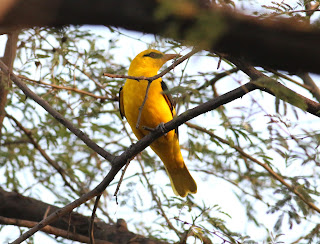I had not planned to awake stupidly early because we would
not be able to get into the park until after breakfast anyway. It was my loss,
as I was informed for future mornings that the roof of our accommodation
provided an excellent vis-mig point for birds entering and leaving it park.
Breakfast was at half 7, and as a result we did not make it into the park until
half eight.
Bharatpur:
Keoladeo National Park
Our progress through the park was slow the previous
afternoon, so we decided to get a rickshaw up to the area where we had finished
the previous evening as a way to save time. Most of the birding today was in
the vast wetland area of the reserve. The monsoon had been poor the previous
season and as a result the water levels were much lower than usual, and there
were 50% less birds according to our guide. This was staggering to comprehend
as there were still thousands of birds in the park. Wildfowl, Herons and other
waterbirds were abundant in every area of water; every tree had warblers,
flycatchers and chats whilst overhead soared raptors in a huge variety of
species. It was truly phenomenal birding, nothing like I have ever experienced
before. We spent all day in the park, but by the time we left we had still
covered very little real ground, the birding was so absorbing.
Highlights:
Brown Rock
Chat - Its hardly the most inspiring name for a bird, and for many
it would not be the most inspiring species, but I was a big fan of their charm.
They were common around Bharatpur the town itself, and could be seen on many
rooftops from our accommodation in full song.
Bonelli’s
Eagle - With so many
raptors on display; Hawks, Vultures and Eagles, it would seem unlikely that one
bird would stand out, but it did. A cracking Bonelli’s Eagle had clearly
developed a taste for the parks wildfowl and spent a large chunk of the morning
hunting the parks teal. The amazing thing was that it was hunting right
alongside the path, so every time it bombed through chasing the ducks you would
get amazing views. I can’t say that I saw it actually take anything, but it was
still amazing to observe.
Lesser
Whistling Duck - Perhaps the species with the best response to the
eagles were the large flocks of hundreds of Lesser Whistling Ducks. You could
hear them all calling a mile off, making no secret of their presence. However
when an eagle came through the entire flock would seemingly jump under the
water creating an enormous splash and an eerie silence.
Sarus Crane
- We only saw two very distant pairs of this bird, a park speciality, but
it has to be a highlight simply for the fact that it is the world’s tallest
bird. It’s just a shame we could not see them better.
Yellow-footed
Green Pigeon - I’ve always been a fan of ridiculous birds, and green
pigeons are the perfect representation of that. You could be happily birding
when a fig or seed pod would drop next to you, and when you looked up there
were anywhere between five and thirty of these birds sat up in the tree. Always
a highlight to see!
-Brown Rock Chat
-Intermediate Egret
-White-throated Kingfisher
-White-breasted Waterhen
-Lesser Flameback
-Lesser Whistling Duck
-Spotted Owlet
-Little Cormorant
-Woolly-necked Stork
-Bronze-winged Jacana
-Oriental Magpie Robin
-Yellow-footed Green Pigeon
-Knob-billed Duck
-Pied Kingfisher
-Indian Vulture
-White-tailed Sea Eagle
-Painted Stork
-Long-tailed Shrike
-Ashy Prinia
-Crested Serpent Eagle
-Collared Scops Owl
-Indian Flying Fox
-Brahminy Starling
-Asian Darter
-Ruddy-breasted Crake
-Sarus Crane
-Yellow Monitor
-Indian Golden Oriole
-Yellow-footed Green Pigeon
Species
List:
Keoladeo
National Park: Ring-necked Parakeet, Jungle Babbler, Black-winged
Stilt, Laughing Dove, Feral Pigeon, Common Myna, Great White Egret, House Crow,
Red-vented Bulbul, House Sparrow, Citrine Wagtail, Brown Rock Chat, Oriental
White-eye, Brahminy Starling, Grey Wagtail, Rufous Treepie, Asian Pied
Starling, Grey Heron, Black Drongo, Peafowl, Red-breasted Flycatcher, Hume’s
Leaf Warbler, Coot, Gadwall, Teal, Moorhen, Common Tailorbird, Shoveler,
White-breasted Kingfisher, Bluethroat, Pied Bushchat, Southern Coucal, Blyth’s
Reed Warbler, Bar-headed Goose, Grey Francolin, Red-wattled Lapwing, Siberian
Chiffchaff, Plain Prinia, Intermediate Egret, Little Cormorant, Bar-backed
Shrike, Oriental Magpie Robin, White-tailed Plover, Ruddy Shelduck, Lesser
Flameback, Ashy-headed Prinia, Asian Darter, Paddyfield Pipit, Bronze-winged
Jacana, Bonelli’s Eagle, Lesser Whistling Duck, Pied Kingfisher, Grey-headed Swamphen,
Little Grebe, Large Grey Babbler, Pintail, Marsh Harrier, Garganey, Sarus
Crane, Greylag Goose, Eastern Imperial Eagle, Greater Spotted Eagle,
Woolly-necked Stork, Black-headed Ibis, Common Snipe, Ruff, Red-rumped Swallow,
Plain Martin, Wire-tailed Swallow, Black Bittern, Long-tailed Shrike, Indian
Pond Heron, Common Kingfisher, Ferruginous Duck, Yellow-footed Green Pigeon,
Knob-billed Duck, Dusky Eagle Owl, Painted Stork, Crested Serpent Eagle,
White-tailed Sea Eagle, Little Egret, Shikra, Indian Vulture, Great Cormorant,
Indian Cormorant, Black-crowned Night Heron, Barn Swallow, Glossy Ibis,
Spoonbill, Alba Wagtail, Ruddy-breasted Crake, Striated Heron, Indian Roller,
Cotton Pygmy Goose, Indian Grey Hornbill, Eurasian Sparrowhawk, Collard Dove,
European Stonechat, Hoopoe, Nilgai,
Sambar, Spotted Deer, Large Indian Mongoose, Five-striped Palm Squirrel, Indian
Flying Fox, Rhesus Macaque, Brahminy Terrapin, Indian Softshell Turtle, Yellow
Water Monitor, Plain Tiger, White
Orange Tip, Large Salmon Arab, White Arab,




































No comments:
Post a Comment